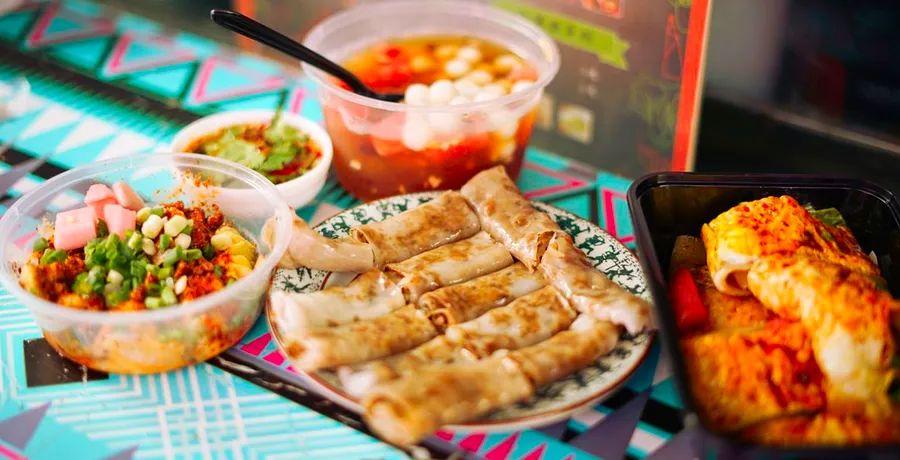The Street Food Revival in Chengdu

As dusk falls over Chengdu, the capital of Sichuan province in southwestern China, the streets come alive with a cacophony of enticing aromas. On one corner, an elderly woman skillfully fries potatoes, mixing them with scallions, garlic, salt, and sugar for eager patrons; across the way, a vendor serves cold noodles drenched in black vinegar and a hint of chile oil. Tucked between clothing stores, a couple sizzles guokui, crispy pancakes stuffed with meat and topped with fermented veggies and Sichuan peppercorns. A little further down, young street vendors offer third-wave coffee in vibrant cups to the youth.
Chengdu boasts a rich street food history, benefiting from mild weather that invites locals to embrace outdoor leisure—enjoying tea, playing mahjong, and soaking up the atmosphere. According to Anita Shiwen Lai, founder of Chengdu Food Tours, many iconic dishes, including dandan mian (spicy noodles), tang you guo zi (chewy rice balls with sugar and sesame), dan hong gao (egg cake), and chuan chuan (hot pot skewers), originated from these bustling streets.
'Street food has always been a vital and irreplaceable aspect of our culinary culture,' notes Lai.
Yet, the vibrant street scene we see today in Chengdu is reminiscent of the past. Despite its deep roots, street food faced challenges starting in the 2000s when the government labeled these stalls as 'backward' and 'uncivilized,' resulting in their removal from public spaces due to urban development. Those who remained operated in constant anxiety of the chengguan (city inspectors), always on alert to flee at the first sign of authority.
When the novel coronavirus struck China last January, many feared it would spell disaster for street food in Chengdu. Strict lockdowns confined residents to their apartment complexes, leaving vendors, many of whom were migrant workers from rural areas, without a means to survive. Many returned to their home villages, potentially for good.
 A moving barbecue street stall.
A moving barbecue street stall.However, when the COVID restrictions eased in May, the Chengdu government took an unexpected turn. In a significant shift from two decades of policy, local authorities began actively promoting the establishment of street stalls. This initiative aimed to revitalize the stagnant economy, providing temporary relief to unemployment and stimulating consumer spending. The outcome was remarkable: over 100,000 people found new income streams almost overnight, prompting Premier Li Keqiang to extend similar policies across China.
That summer marked a renaissance for Chengdu's street food scene. Veteran vendors returned, joined by countless first-time entrepreneurs of all ages. While some newcomers were overwhelmed by the demands of street selling and quickly packed up after a single night, others persevered. By day, sidewalks became populated with stools from vendors who had staked their claims hours in advance. As night fell, bustling pedestrian areas like Chunxi Lu, Jianshe Road, and Yulin filled with brightly lit stalls, rich aromas, and an array of dishes too numerous to sample in a month.
'It's incredible to witness the street stall economy thriving again, with the government actively supporting vendors on the streets,' says Lai of Chengdu Food Tours. Furthermore, with small food businesses no longer caught in the dilemma of high rents for brick-and-mortar locations or ongoing harassment from city officials, they can focus on preserving culinary traditions, according to Lai.
'This preserves the authentic flavors of the street,' Lai notes. 'It allows Chengdu to reconnect with its roots and true character.'
 Rice noodle salad.
Rice noodle salad. Barbecue skewers lining the streets of Chengdu
Barbecue skewers lining the streets of ChengduWang Xue, 43, serves bobo chicken—a traditional dish of cold spicy chicken offal on skewers—from her stall on Jianshe Road, near Sichuan University. Before the pandemic, she had planned to sell her bobo chicken spice mix online. However, inspired by the emerging street food economy, she opted to open a stall so customers could sample her seasonings directly. Now, her stall acts as both a restaurant and a promotional hub for her online venture.
'While I sell bobo chicken for customers to enjoy, I can also offer the bobo ji seasonings for them to take home and create their own authentic meals,' Xue explains.
Not all street food today reflects traditional Chengdu flavors; newer vendors are introducing popular dishes from various regional cuisines across China. Close to Wang Xue’s stall, Xiao Li offers snacks inspired by Yunnan, a province southwest of Sichuan known for its pleasant climate and vibrant cuisine reminiscent of Laos and Vietnam. On any given day, Xiao Li serves spring rolls, fried tofu, and Yunnan rice noodles.
Xiao Li, who previously worked in the hotel industry, mentions that her street stall has kept her occupied and financially afloat, although she recently secured a hotel job and thinks her time selling Yunnan snacks may be coming to an end. Nonetheless, she expresses a sense of accomplishment from her brief experience running her own food business.
Alongside traditional street food offerings, trendy establishments catering to young Chinese preferences for coffee and cocktails are now commonplace. These businesses often focus on design, branding, and fostering a sense of community. One popular coffee stall invites artists to leave their stickers, which the owners then attach to takeaway cups, providing artists with exposure and the shop with eye-catching graphics.
 Uncle Lan serves cocktails to customers who linger and chat.
Uncle Lan serves cocktails to customers who linger and chat.In Yulin, a historic Chengdu neighborhood favored by youth and food enthusiasts, the second-wave street stall movement is flourishing. At its heart is Uncle Lan, a prominent figure in the Chengdu underground art and nightlife scene, who operates the Cocktail Bus, his mobile bar. Uncle Lan crafts vibrant cocktails like the Sleepwalker and the Raging Teenager, along with mojitos and gin and tonics, for groups of patrons enjoying drinks and conversation on stools.
Lan, whose previous endeavors have included pop-up art shows, a rave bus, and an underground night market, launched his mobile bar to adapt after a pandemic-related art exhibition fell through. He has since developed a passion for using the street stall as a platform for cultural exchange and community engagement. He observed that visitors from diverse backgrounds at his mobile bar often sparked conversations with one another.
'At the street stall, anyone can come together,' Lan explains. 'People transcend typical social barriers.' This sets Uncle Lan apart from street bars that only offer takeaway cocktails. He insists that patrons enjoy their drinks at the bus, allowing them to watch him at work and engage with other customers. 'There’s ample opportunity to expand Chengdu culture,' he reflects.
As he mixes a Raging Teenager—a combination of vodka, ginger beer, lime juice, and Sichuan peppercorn—Uncle Lan reminisces about the 1990s, the heyday of Chengdu's street stall economy, when he ran his own stall selling iced jelly as a teenager—a time he had nearly forgotten until this summer. 'They used to call me the street stall king,' he recalls. 'And I feel like I'm returning to that now.'
 Jianbing is one of the most beloved street foods in Chengdu.
Jianbing is one of the most beloved street foods in Chengdu.Lauren Teixeira is a writer who was previously based in Chengdu; she now resides in Washington, DC. Mia Zhang is a photographer based in Chengdu.

1

2

3

4

5
Evaluation :
5/5